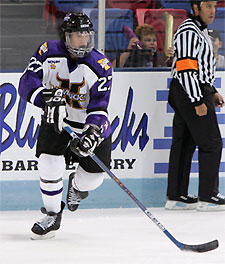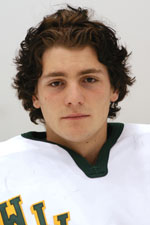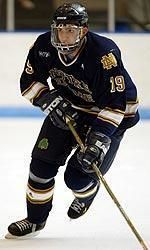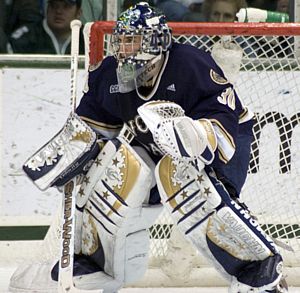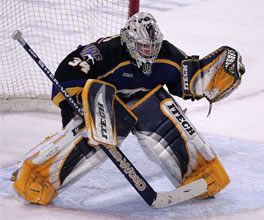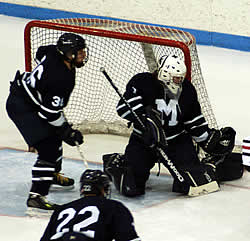It’s time once again to do what we like to call Bracketology — College Hockey Style. It’s our weekly look at how the NCAA tournament would wind up if the season ended today.
It’s a look into the possible thought processes behind selecting and seeding the NCAA tournament, and we’ll be bringing you a new one every week until we make our final picks before the field is announced.
Let’s dispense with the particulars, since we’ve beaten them into everyone’s heads. But, if you want to review them, just read the beginning of the last Bracketology to get your fix.
Here, then, are the top 16 of the current PairWise Rankings (PWR), with the bonus, as well as all number-one seeds in conference tournaments that are not in the Top 16 (through all games of March 6, 2007):
1 Minnesota
2 Notre Dame
3 New Hampshire
4 St. Cloud
5 Clarkson
6 North Dakota
7t Miami
8t Boston University
9t Boston College
9t Michigan
11 Maine
12 Denver
13t St. Lawrence
13t Michigan State
13t Massachusetts
16 Colorado College
— Niagara
— Sacred Heart
Number-one seeds:
Atlantic Hockey: Sacred Heart
CHA: Niagara
CCHA: Notre Dame
ECACHL : St. Lawrence
Hockey East : New Hampshire
WCHA: Minnesota
Notes
• Bracketology assumes that the season has ended and there are no more games to be played; i.e., the NCAA Tournament starts tomorrow.
• The number-one seed in each tournaments is the assumed champion of the tournament; therefore, that team gets an autobid to the NCAAs.
Step One
From the committee’s report, choose the 16 teams in the tournament.
We break ties in the PWR by looking at the individual comparisons among the tied teams, and add in any current league leaders that are not currently in the Top 16. Those teams are Niagara and Sacred Heart.
From there, we can start looking at the bubble in a more detailed fashion.
The bubbles consist Miami and Boston University at number 7, Boston College and Michigan at number 9, and St. Lawrence, Michigan State and Massachusetts at number 13.
Looking at the individual comparisons, Miami defeats BU, BC defeats Michigan.
At number 13, we have a round-robin of sorts as SLU defeats MSU, MSU defeats UMass and UMass defeats SLU. So we break via the RPI. Therefore SLU is 13, MSU is 14 and UMass is 15.
That is unfortunate for the Minutemen, as Niagara and Sacred Heart take spots 15 and 16 because of autobids.
Therefore the 16 teams in the tournament, in rank order, are:
1 Minnesota
2 Notre Dame
3 New Hampshire
4 St. Cloud
5 Clarkson
6 North Dakota
7 Miami
8 Boston University
9 Boston College
10 Michigan
11 Maine
12 Denver
13 St. Lawrence
14 Michigan State
15 Niagara
16 Sacred Heart
Step Two
Now it’s time to assign the seeds.
No. 1 Seeds — Minnesota, Notre Dame, New Hampshire, St. Cloud
No. 2 Seeds — Clarkson, North Dakota, Miami, Boston University
No. 3 Seeds — Boston College, Michigan, Maine, Denver
No. 4 Seeds — St. Lawrence, Michigan State, Niagara, Sacred Heart
Step Three
Place the No. 1 seeds in regionals. Because New Hampshire is hosting a regional, the Wildcats are placed first. Following the guidelines, we then place the other No. 1 seeds based on proximity to the regional sites.
No. 3 New Hampshire is placed in the Northeast Regional in Manchester.
No. 1 Minnesota is placed in the Midwest Regional in Grand Rapids.
No. 2 Notre Dame is placed in the East Regional in Rochester.
No. 4 St. Cloud is placed in the West Regional in Denver.
Step Four
Now we place the other 12 teams so as to avoid intra-conference matchups if possible.
Begin by filling in each bracket by banding groups. Remember that teams are not assigned to the regional closest to their campus sites by ranking order within the banding (unless you are a host school, in which case you must be assigned to your home regional).
If this is the case, as it was last year, then the committee should seed so that the quarterfinals are seeded such that the four regional championships are played by No. 1 v. No. 8, No. 2 v. No. 7, No. 3 v. No. 6 and No. 4 v. No. 5.
So therefore:
No. 2 Seeds
No. 5 Clarkson is placed in No. 4 St. Cloud’s Regional, the West Regional.
No. 6 North Dakota is placed in No. 3 New Hampshire’s Regional, the Northeast Regional.
No. 7 Miami is placed in No. 2 Notre Dame’s Regional, the East Regional.
No. 8 Boston University is placed in No. 1 Minnesota’s Regional, the Midwest Regional.
No. 3 Seeds
Our bracketing system has one Regional containing seeds 1, 8, 9, and 16, another with 2, 7, 10, 15, another with 3, 6, 11, 14 and another with 4, 5, 12 and 13.
Therefore:
No. 12 Denver is placed in No. 5 Clarkson’s Regional, the West Regional, as the host institution.
No. 9 Boston College is placed in No. 8 Boston University’s Regional, the Midwest Regional.
No. 10 Michigan is placed in No. 7 Miami’s Regional, the East Regional.
No. 11 Maine is placed in No. 6 North Dakota’s Regional, the Northeast Regional.
No. 4 Seeds
One more time, taking No. 16 v. No. 1, No. 15 v. No. 2, etc.
No. 16 Sacred Heart is sent to Minnesota’s Regional, the Midwest Regional.
No. 15 Niagara is sent to Notre Dame’s Regional, the East Regional.
No. 14 Michigan State is sent to New Hampshire’s Regional, the Northeast Regional.
No. 13 St. Lawrence is sent to St. Cloud’s Regional, the West Regional.
The brackets as we have set them up:
West Regional:
St. Lawrence vs. St. Cloud
Denver vs. Clarkson
Midwest Regional:
Sacred Heart vs. Minnesota
Boston College vs. Boston University
East Regional:
Niagara vs. Notre Dame
Michigan vs. Miami
Northeast Regional:
Michigan State vs. New Hampshire
Maine vs. North Dakota
Our first concern is avoiding intraconference matchups. We have two right now in BC vs. BU and Michigan vs. Miami.
So we just switch the lower seeds with each other.
So the tournament is now fixed.
West Regional:
St. Lawrence vs. St. Cloud
Denver vs. Clarkson
Midwest Regional:
Sacred Heart vs. Minnesota
Michigan vs. Boston University
East Regional:
Niagara vs. Notre Dame
Boston College vs. Miami
Northeast Regional:
Michigan State vs. New Hampshire
Maine vs. North Dakota
Bracketing the Frozen Four, if all four number-one seeds advance, then the top overall seed plays the No. 4 overall, and No. 2 plays No. 3. Therefore, the winners of the Midwest and West Regionals face each other in one semifinal (Minnesota and St. Cloud’s brackets), while the winners of the Northeast and East Regionals (New Hampshire and Notre Dame’s brackets) play the other semifinal.
Possibilities, Possibilities
So what do we have to look forward to this weekend? What kind of movement might happen here?
Let’s take a look at a few key matchups and discuss them with a little more detail.
Maine at Massachusetts — This is a huge series for both teams because the loser cannot make its case anymore. To say this series is larger for Massachusetts is an understatement. The Minutemen are the first team out at the moment, despite sweeping Maine last weekend.
So what happens should Massachusetts sweep Maine again? To start with, the Minutemen could pick up comparison wins against Colorado College and Michigan State, putting them on the right side of the bubble with 13 total comparison wins.
Meanwhile, Maine would almost certainly lose its comparison to Miami, unless Miami also gets swept by Lake Superior. Maine would also probably drop the comparison to Denver. The other comparisons that Maine currently is winning, it will be hard to lose, despite getting swept. Therefore, Maine would go to 12 comparison wins. It doesn’t hurt that much.
Should Maine sweep Massachusetts, the Minutemen are gone.
So the bottom line is that even if Maine gets swept, the Black Bears will still be on the bubble and teetering depending upon what happens.
Michigan Tech at Colorado College — It’s plain and simple here. Both teams are on the edge, the loser of the series ends its season. The winner lives another day.
With a sweep of Michigan Tech, CC can turn at least one comparison, that with St. Lawrence, potentially pushing them above SLU in the PairWise.
Wisconsin at Denver — It doesn’t appear that Wisconsin can get into the tournament unless it wins the WCHA Final Five. That’s pretty evident. But what about Denver?
Losing the series won’t hurt much, but winning it won’t move the Pioneers up too much either. So it looks like Denver is stuck in the 11-12 area for now.
Lake Superior at Miami — Lake Superior is the last team in the Top 25 right now and it certainly affects teams like Michigan, Miami and Michigan State.
Miami is 3-1 against LSSU, Michigan is 1-1 and Michigan State is 2-0. So the Spartans want Lake Superior to stay. Michigan is meh on the matter and Miami wants them to stay as well.
But does a Miami series win drop Lake Superior from the Top 25?
Let’s look at the RPI. Who is right behind Lake State? Niagara, Sacred Heart and Harvard. There is a .0013 difference to Niagara, .0044 from Sacred Heart and .0052 from Harvard. Niagara has a chance, should it win its two games and get the autobid. Sacred Heart does not have a chance of getting past Lake Superior and Harvard, which plays Clarkson this weekend, absolutely has a chance.
So what are these CCHA teams rooting for? A Miami sweep, which would almost guarantee Miami a bid, Clarkson downing Harvard this weekend and Niagara not winning the CHA.
Nebraska-Omaha at Michigan State — The same can almost be said of UNO, which is just .0005 ahead of Lake Superior in the RPI.
Michigan is 2-0 against the Mavericks, MSU is 1-0-1, and Miami is 2-0. So these teams want UNO in the Top 25.
The good news for those squads? Either UNO or LSSU will be in the Top 25.
So let’s break it down in terms of tiers.
Teams that definitely need to win their conference tournaments to get in:
Everyone from Dartmouth on down.
Teams that can have things break their way should they get through this week:
Everyone between Miami and CC.
Teams that are in no matter what:
North Dakota and up.
I still think that Maine and Denver are in, since it will be hard to turn three or four comparisons for each team, but you never, ever know.
